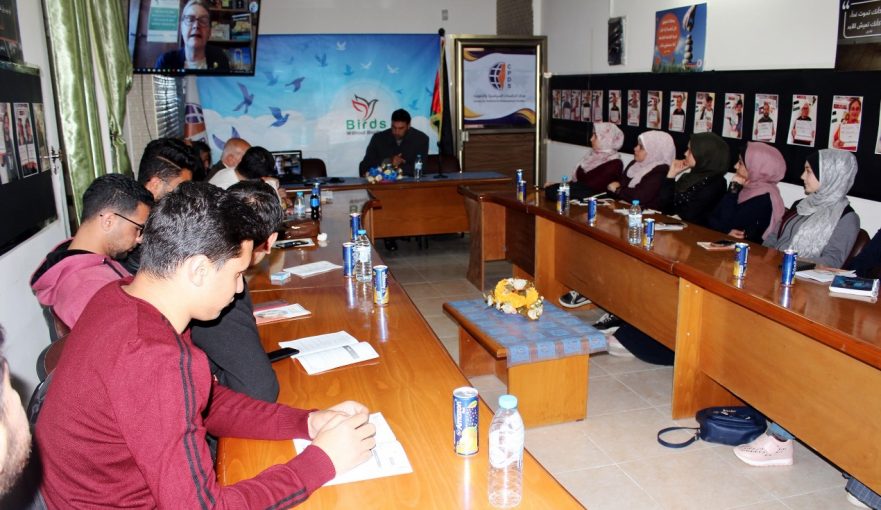“People are demanding their basic rights! People want to live in dignity… It is a choice between slow death under siege or being shot at the fence.”
“I think the Great March of Return is the last option the Palestinian people have right now.”
“The voice of young people in Gaza has to be heard!”
These were just a few of the heartfelt pleas voiced when two dozen, mainly youthful social-justice activists from Gaza took part in a (Skyped) discussion with JWE president Helena Cobban, April 23.
This hour-long conversation was convened, on the Gaza end, by the Center for Political and Development Studies (CPDS), a Gaza-based research center, and featured members of their “Birds Without Borders” youth-activist team. It coincided with the opening, in CPDS’s Hashim Yeop Sani Library, of an exhibition of 40 photos of international (mainly US-based) solidarity activists holding up signs that proudly proclaim #IStandWithGaza.
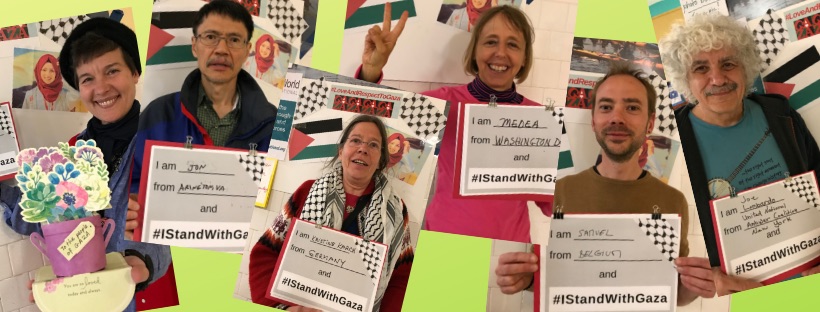
The session marked almost exactly eight years since Ms. Cobban took part in a seminar at CPDS in person (as reported by participant Yousef Aljamal, here.)
The April 23 session was organized by CPDS Librarian Ahmad Ghazal. Ms. Cobban opened it by speaking a little about her earlier work as an author and publisher, and about Just World Educational’s work to expand the discourse in the United States, especially on the Palestine Question. “There has been so much disinformation here,” she told the Gaza crowd. “The impact of the Zionists at all levels of the culture has been very negative. We try to bring more Palestinian voices and Palestinian perspectives such as the wonderful Palestinian cartoonist Mohammed Sabaneh. He shared his art and perspective with the American public.”
But she also noted that over the 35 years she has been in the United States, “Things have really changed here, at the grassroots level and even now a little bit at the political level. I have worked for years alongside others, including many Palestinians Americans, to try to explain things to people. But now finally people are listening.”
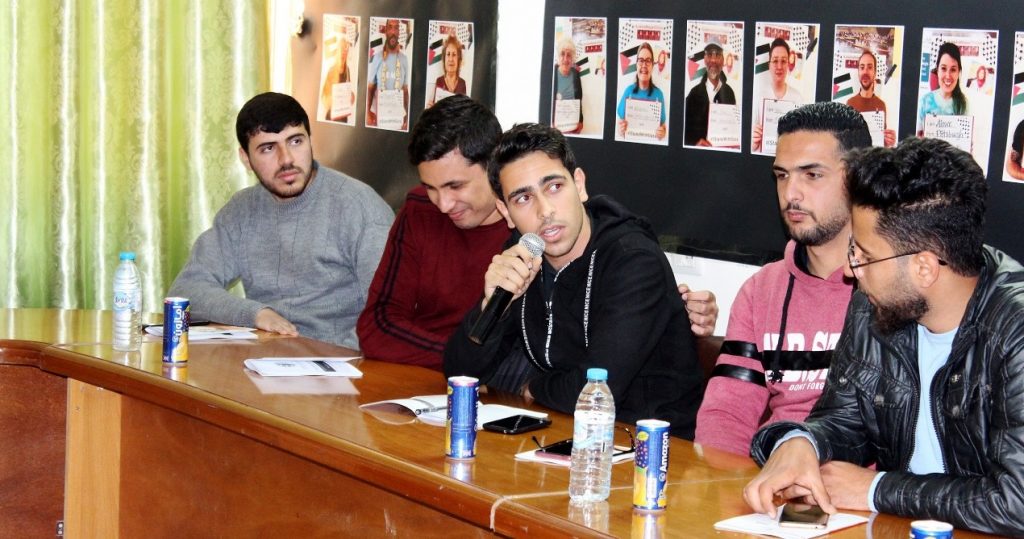
She cited the recent election to the U.S. Congress of supporters of Palestinian rights such as Rep. Rashida Tlaib from Michigan and Rep. Ilhan Omar from Minnesota as demonstrating a real change in the attitudes of many grassroots Americans to the Palestine Question. She noted that Sen. Bernie Sanders and other national-level leaders are now also prepared to express open criticism of Israeli policies and that attitudes toward Israel are changing within many sections of the U.S. citizenry, including among Jewish Americans—but she stressed that much more educational work remains to be done.
But she stressed that she wanted to hear from the people of Gaza themselves regarding the situation of their families and the difficulties they go through and what they expect from people outside especially in the United States to do. She asked the Gaza youths if they judged that a mainly-online project like #IStandWithGaza is meaningful for them.
The first person to respond was Ms. Rana Shubair, who observed, “There are mostly university students here today. Some people aged 30 don’t know from Palestine except Gaza because they have never seen any other parts of Palestine. We can’t visit Jerusalem, we can’t visit any Palestinian city. So, it is a psychological struggle as well as a physical one.”
Rana noted that the internet allows Gaza Palestinians to connect with people in the outside world, including by writing about their daily lives. “We love life, we want to live, love, and get an education!” she stressed. Rana’s view was shared by Helena eight years ago, when she told Gaza’s youths “The internet is your Tahrir square.”
“We believe that armed struggle is not the only way to end the occupation. That’s why a year ago people started the peaceful Great March of Return. People were peacefully demanding their right to live in peace. The protesters were received with fire and thousands of people were shot by Israeli snipers, many of them were children. We want from people outside to stand in solidarity with us and to boycott Israel.”
Helena asked Rana if it is worth to continue the Great March of Return a year after it was launched or if she thinks it is too painful to do so.
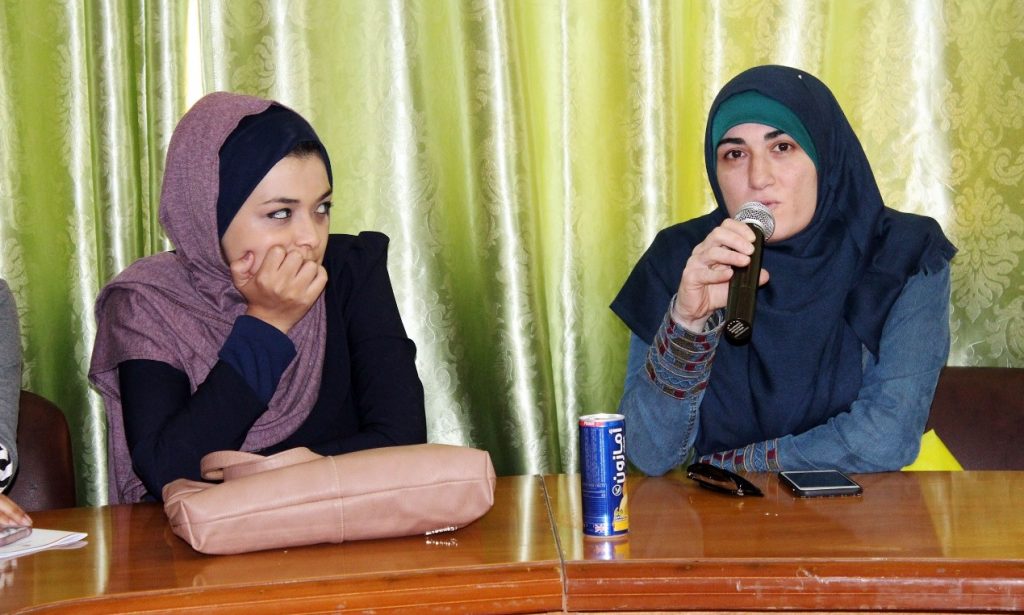
“People are demanding their basic human rights,” Rana responded. “People want to live in dignity. All people have seen is destruction and war. People have survived three wars and 80% of young people are unemployed. These are the people who are protesting. It is a choice between slow death under siege or being shot at the fence.”
Jehad Al-Hallaq added: “The voice of young people in Gaza to has to be heard. Many people around the world do not know who is the victim, who is the victimizer. So, it is our responsibility to tell the truth about what is going on here.”
Wesam Abujarad commented on the #IStandWithGaza campaign that it “shows us how people around the world really care about us. The situation of youths here is known to everyone. They are suffering. There are no jobs. The only thing that we are convinced of is to reveal this suffering to people around the world.”
The session included quite a lot of discussion of the Great March of Return. Yousef Ghabin described it as “the last option the Palestinian people have right now.” He added:
When you have a lot of people protesting, the Israeli army will be on alert all the time 24/7. This will of course cost Israel a lot of money and efforts and will come at a political price. Israel can’t live with this situation. When people protest they convey their message to the world and the reality they live in the Gaza Strip. They want to tell the world what is really happening and tell them about their suffering. If people in Gaza suffer, Israel has to suffer with them.
The GMR serves to expose Israeli practices against protesters and Palestinians in Gaza. It shows the world that the Israeli army is using live ammunition against peaceful protesters. A lot of women and children fell victims to the practices of the Israeli occupation. I think the GMR is effective. The Palestinian Authority spoke to Israel for 26 years now and they got nothing. The Gaza Strip is under siege. So, the only way for the Palestinian people to keep the cause alive is to protest and say no, to scream. There are victims, but it is the price of freedom.
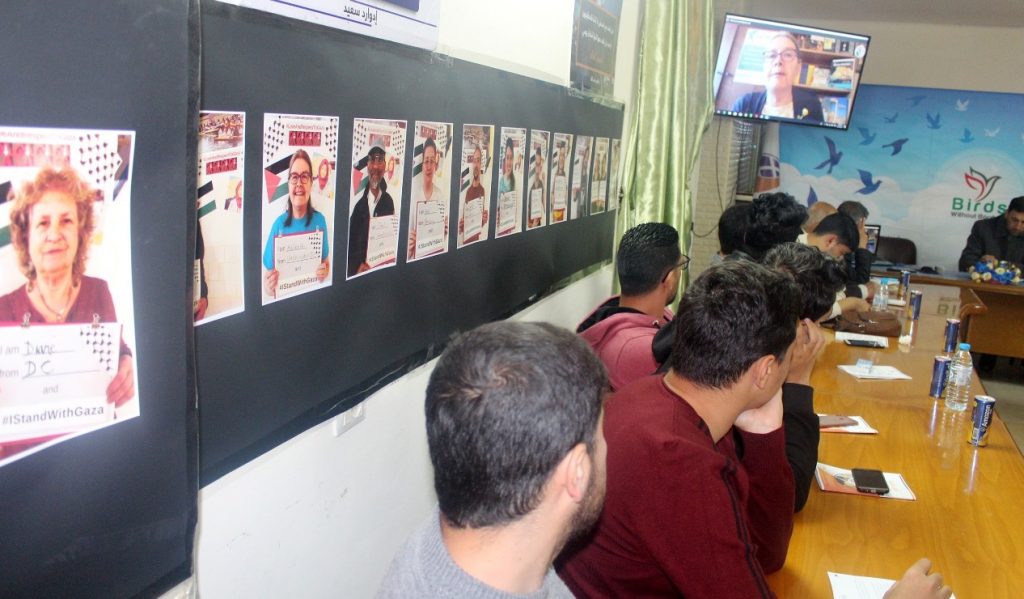
Helena asked what reactions the people at CPDS had seen from inside Israel to the GMR. Yousef replied, “There are people who expose Israeli crimes such as the Israeli organization B’Tselem, and other media leftist outlets such as Haaretz. They don’t have a lot of effectiveness. They can say something, but they can’t do anything, because they are weak inside Israel.”
Another participant added, “There are people in Israel who support the Great March of Return, but they are not many. They take photos of Israeli snipers killing Palestinians and post them to social media. Israelis tend to cover up their crimes. But we should fight to expose their crimes and support the Palestinian cause.”
Helena had asked what the CPDS participants thought their supporters in the United States and other countries could most effectively do to support their cause. Wesam Abujarad’s view was that, “We know that Israelis try to have hegemony over the media. So, it is very important for Palestinians and their supporters to publish and write to change the perception of people around the world. Such books tell the truth about our issue. They tell our suffering in Gaza and the West Bank.”
As the conversation got lively, Helena showed the audience Gaza Kitchen, a book that her company Just World Books had published in the United States, telling them that sometimes the way to people’s hearts is their stomachs!
More seriously, Yousef Ghabin stressed the following priorities for rights supporters in the west: “We expect you and other activists in the United States to expose the crimes committed against the Palestinian people, especially during the Great March of Return. There are crimes committed against protesters including women and children. They also target media outlets and press people who cover these protests because they want to hide their crimes, so they don’t want these media outlets to come and cover what is going on. So, please, convey what is going on in Gaza to people in the United States by using social and mainstream media!”
Yousef also urged Americans to speak out about the 7,000-plus Palestinian prisoners in Israel’s jails and the plight of Palestinian Jerusalem. He noted that the situation in Jerusalem had deteriorated badly after the United States moved its embassy there last year.
“Israel,” he said, “is using a lot of abusive tactics to pressure people in Jerusalem such as confiscating their IDs, demolishing their houses, arresting people there. Israel wants to push Palestinians out of Jerusalem to make a place for the Zionist Israeli settlers. I think people in Jerusalem are suffering a lot and there is a little media coverage about it… The international media should cover the situation of people in Jerusalem too.”
Helena asked the CPDS people how they thought their own political leadership could be more effective, and whether a new round of Palestinian elections might be helpful. Yousef responded: “Our leadership are far away from reality. I think one big problem we have is our leadership. Our leadership both in the Gaza Strip and the West Bank are not in touch with the needs of our people… Our leaders don’t want to have elections because they want to stick to power they have! People are not satisfied with the PA after all these years of peace talks, so our leaders will try to maintain the status quo.”
After the Skype session was over, Helena Cobban noted that it was difficult and heart-wrenching for her not to be able to have the same kinds of in-person discussion with young people at CPDS that she was able to have back in 2011—“though I realize that the brutal and inhuman siege and travel ban that Israel has maintained on Gaza for so many years, with the full support of the U.S. government, is a thousand times harder for the people in Gaza than it is for me.” But she and her colleagues on the board of Just World Educational are delighted that the April 23 session was just one in a series of activities that Just World Educational will be undertaking this year to highlight the situation in Palestine.

